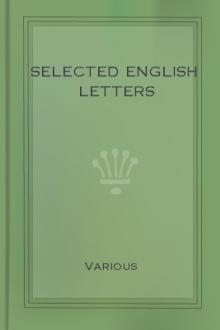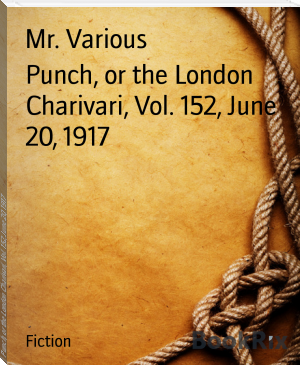Selected English Letters by - (free e novels txt) 📕

- Author: -
- Performer: -
Book online «Selected English Letters by - (free e novels txt) 📕». Author -
Reminiscences
4 March, 1822.
My Dearest Friend,
I have been much more than ordinarily unwell for more than a week past—my sleeps worse than my vigils, my nights than my days;
—The night's dismay
Sadden'd and stunned the intervening day;
but last night I had not only a calmer night, without roaming in my dreams through any of Swedenborg's Hells modérés; but arose this morning lighter and with a sense of relief….
I shall make you smile, as I did dear Mary Lamb, when I say that you sometimes mistake my position. As individual to individual, from my childhood, I do not remember feeling myself either superior or inferior to any human being; except by an act of my own will in cases of real or imagined moral or intellectual superiority. In regard to worldly rank, from eight years old to nineteen, I was habituated, nay, naturalised, to look up to men circumstanced as you are, as my superiors—a large number of our governors, and almost all of those whom we regarded as greater men still, and whom we saw most of, viz. our committee governors, were such—and as neither awake nor asleep have I any other feelings than what I had at Christ's Hospital, I distinctly remember that I felt a little flush of pride and consequence—just like what we used to feel at school when the boys came running to us—'Coleridge! here's your friends want you—they are quite grand,' or 'It is quite a lady'—when I first heard who you were, and laughed at myself for it with that pleasurable sensation that, spite of my sufferings at that school, still accompanies any sudden reawakening of our school-boy feelings and notions. And oh, from sixteen to nineteen what hours of Paradise had Allen and I in escorting the Miss Evanses home on a Saturday, who were then at a milliner's whom we used to think, and who I believe really was, such a nice lady;—and we used to carry thither, of a summer morning, the pillage of the flower gardens within six miles of town, with Sonnet or Love Rhyme wrapped round the nose-gay. To be feminine, kind, and genteelly (what I should now call neatly) dressed, these were the only things to which my head, heart, or imagination had any polarity, and what I was then, I still am.
God bless you and yours.
ROBERT SOUTHEY1774-1843
TO JOSEPH COTTLEQuestion of copyrights
Greta Hall, 20 April, 1808.
My dear Cottle,…
What you say of my copyrights affected me very much. Dear Cottle, set your heart at rest on that subject. It ought to be at rest. These were yours, fairly bought, and fairly sold. You bought them on the chance of their success, which no London bookseller would have done; and had they not been bought, they could not have been published at all. Nay, if you had not purchased Joan of Arc, the poem never would have existed, nor should I, in all probability, ever have obtained that reputation which is the capital on which I subsist, nor that power which enables me to support it.
But this is not all. Do you suppose, Cottle, that I have forgotten those true and most essential acts of friendship which you showed me when I stood most in need of them? Your house was my house when I had no other. The very money with which I bought my wedding-ring, and paid my marriage fees, was supplied by you. It was with your sisters I left Edith during my six months' absence, and for the six months after my return it was from you that I received, week by week, the little on which we lived, till I was enabled to live by other means. It is not the settling of a cash account that can cancel obligations like these. You are in the habit of preserving your letters, and if you were not, I would entreat you to preserve this, that it might be seen hereafter. Sure I am, there never was a more generous or a kinder heart than yours; and you will believe me when I add, that there does not live that man upon earth, whom I remember with more gratitude and more affection. My heart throbs and my eyes burn with these recollections. Good night! my dear old friend and benefactor.
TO JOHN MAYWaterloo
Liège, 6 Oct. 1815. Six p.m.
My dear friend,
I have a happy habit of making the best of all things; and being just at this time as uncomfortable as the dust and bustle, and all the disagreeables of an inn in a large filthy manufacturing city can make me, I have called for pen, ink, and paper, and am actually writing in the bar, the door open to the yard opposite to this unwiped table, the doors open to the public room, where two men are dining, and talking French, and a woman servant at my elbow is lighting a fire for our party. Presently the folding-doors are to be shut, the ladies are to descend from their chambers, the bar will be kept appropriated to our house, the male part of the company will get into good humour, dinner will be ready, and then I must lay aside the grey goose-quill. As a preliminary to these promised comforts, the servant is mopping the hearth, which is composed (like a tesselated pavement) of little bricks about two inches long by half an inch wide, set within a broad black stone frame. The fuel is of fire-balls, a mixture of pulverized coal and clay. I have seen a great deal and heard a great deal,—more, indeed, than I can keep pace with in my journal, though I strive hard to do it; but I minute down short notes in my pencil-book with all possible care, and hope, in the end, to lose nothing….
Flanders is a most interesting country. Bruges, the most striking city I have ever seen, an old city in perfect preservation. It seems as if not a house had been built during the last two centuries, and not a house suffered to pass to decay. The poorest people seem to be well lodged, and there is a general air of sufficiency, cleanliness, industry, and comfort, which I have never seen in any other place. The cities have grown worse as we advanced. At Namur we reached a dirty city, situated in a romantic country; the Meuse there reminded me of the Thames from your delightful house, an island in size and shape resembling that upon which I have often wished for a grove of poplars, coming just in the same position. From thence along the river to this abominable place, the country is, for the greater part, as lovely as can be imagined….
Our weather hitherto has been delightful. This was especially fortunate at Waterloo and at Ligny, where we had much ground to walk over. It would surprise you to see how soon nature has recovered from the injuries of war. The ground is ploughed and sown, and grain and flowers and seeds already growing over the field of battle, which is still strewn with vestiges of the slaughter, caps, cartridges, boxes, hats, &c. We picked up some French cards and some bullets, and we purchased a French pistol and two of the eagles which the infantry wear upon their caps. What I felt upon this ground, it would be difficult to say; what I saw, and still more what I heard, there is no time at present for saying. In prose and in verse you shall some day hear the whole. At Les Quatre Bras, I saw two graves, which probably the dogs or the swine had opened. In the one were the ribs of a human body, projecting through the mould; in the other, the whole skeleton exposed. Some of our party told me of a third, in which the worms were at work, but I shrunk from the sight. You will rejoice to hear that the English are as well spoken of for their deportment in peace as in war. It is far otherwise with the Prussians. Concerning them there is but one opinion; their brutality is said to exceed that of the French, and of their intolerable insolence I have heard but too many proofs. That abominable old Frederic made them a military nation, and this is the inevitable consequence. This very day we passed a party on their way towards France—some hundred or two. Two gentlemen and two ladies of the country, in a carriage, had come up with them; and these ruffians would not allow them to pass, but compelled them to wait and follow the slow pace of foot soldiers! This we ourselves saw. Next to the English, the Belgians have the best character for discipline….
I bought at Bruges a French History of Brazil, just published by M. Alphonse de Beauchamp, in 3 vols. 8vo. He says, in his Preface, that having finished the first two volumes, he thought it advisable to see if any new light had been thrown upon the subject by modern authors. Meantime, a compilation upon this history had appeared in England, but the English author, Mr. Southey, had brought no new lights; he had promised much for his second volume, but the hope of literary Europe had been again deceived, for this second volume, so emphatically promised, had not appeared. I dare say no person regrets this delay so much as M. Beauchamp, he having stolen the whole of his two first volumes, and about the third part of the other, from the very Mr. Southey whom he abuses. He has copied my references as the list of his own authorities (MSS. and all), and he has committed blunders which prove, beyond all doubt, that he does not understand Portuguese. I have been much diverted by this fellow's impudence.
The table is laid, and the knives and forks rattling a pleasant note of preparation, as the woman waiter arranges them.
God bless you! I have hurried through the sheet, and thus pleasantly beguiled what would have been a very unpleasant hour. We are all well, and your god-daughter has seen a live emperor at Brussels. I feel the disadvantage of speaking French ill, and understanding it by the ear worse. Nevertheless, I speak it without remorse, make myself somehow or other understood, and get at what I want to know. Once more, God bless you, my dear friend.
To HENRY TAYLOR
Anastasius Hope
Keswick, 15 July, 1831.
… Have you seen the strange book which Anastasius Hope left for publication, and which his representatives, in spite of all dissuasion, have published? His notion of immortality and heaven is, that at the consummation of all things he, and you, and I, and John Murray, and Nebuchadnezzar, and Lambert the fat man, and the living skeleton, and Queen Elizabeth, and the Hottentot Venus, and Thurtell, and Probert, and the twelve Apostles, and the noble army of martyrs, and Genghis Khan, and all his armies, and Noah with all his ancestors and all his posterity—yea, all men and all women,





Comments (0)